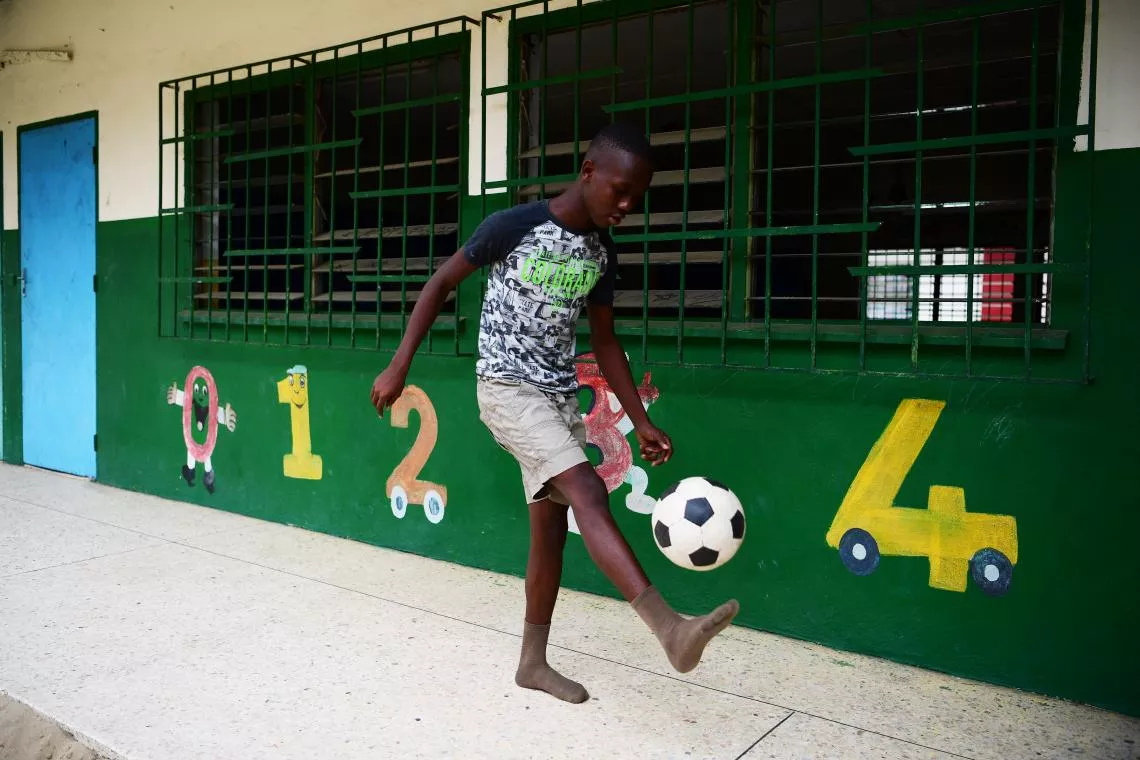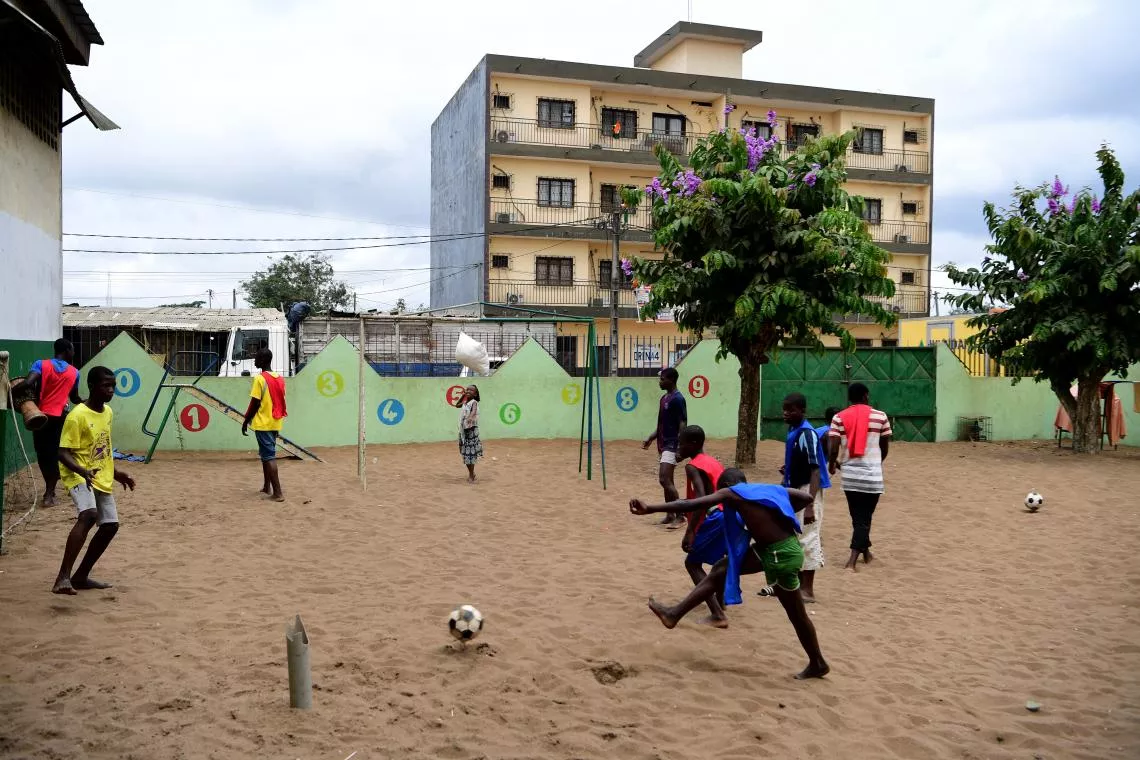In Côte d’Ivoire, protecting children and young people on the move during COVID-19
The pandemic has increased risks for millions of children in vulnerable situations, including migrant and displaced children.

ABIDJAN, Côte d’Ivoire – Almost a year since the COVID-19 crisis began, the pandemic has had a devastating impact on the safety and well-being of children – especially those on the move.
An estimated 33 million children are international migrants; tens of millions more have migrated or been forcibly displaced within their countries. The global pandemic has affected these children particularly badly. At a time when they are most in need of essential services, they face even greater barriers to accessing them.
In sub-Saharan Africa, where many schools are still closed, few children on the move have access to remote learning. Meanwhile, reduced social and child protection services have resulted in an increase in violence against children, including sexual and gender-based violence.
Children who depend on the streets to live or work – many of whom are migrants – are especially vulnerable. In Côte d’Ivoire, UNICEF is working with partners to assist these children, providing them with psychosocial support through counselling and drama therapy, as well as access to education, shelter, meals, clean water and sanitation facilities. UNICEF also works with partners to help reunite children on the move with their families.

Béhé, 17, left his hometown of Bangolo in western Côte d’Ivoire about six years ago. After living on the streets of the capital, Abidjan, he travelled earlier this year to the town of San-Pedro. COVID-19 cases were just being reported in the country, and the resulting curfews made it even harder for those living on the streets to find enough food or money to survive.
“At first, I wasn’t afraid of the disease itself, but I knew it would have an impact on us,” Béhé says. “During the curfew, I was often chased by armed men in the streets.”
Béhé said it was a relief when he was approached by a social worker, who invited him to a child protection centre.
“They gave me everything I needed to be able to protect myself against COVID-19,” he says. “I’m also getting counselling, food and other support. The strict routine and numeracy classes at the centre have taken a bit of getting used to, but I feel like I have hope here. And I’m happy that I’m able to learn things that can help me in the future.”
Interested in mechanics, Béhé wants to open his own garage one day. “I dream of my parents seeing me happy and being proud of me.”

Amadou, 16, is originally from Conakry, the capital of Guinea. He loves football, and when his father heard that there was a chance for his son to attend a training camp in Côte d’Ivoire, he jumped at it.
But things didn’t go according to plan when Amadou arrived in Abidjan. Instead of heading to a training camp, he had to work for the woman who was supposed to be taking care of him. He says he always got blamed if something went missing and he was sometimes beaten.
Amadou eventually decided to run away, but with nowhere else to go, he was forced to live on the streets, relying on friends for food and a place to sleep.
“One of my friend’s parents put me in contact with a social worker. That’s how I arrived at the child protection centre,” he says. After spending several difficult months living on the streets, he moved to a centre in Abobo, a suburb of Abidjan, where he receives food, shelter and classes. There, UNICEF is also helping him reunite with his family.
“They’ll help me find my parents and help me get back to Conakry to be with my father,” he says. “But I still dream about becoming a football player.”

Centres like the one in Abobo offer a safe space for children who have been living on the streets. Social workers train teams to identify at-risk children and to respond to – and help prevent – violence, abuse and exploitation.
Social workers provide psychosocial support for children taken in at protections centres. After an initial counselling session, a specialist from the National Institute of Arts and Culture in Abidjan takes over and organizes drama therapy with the children. Using art and mime, they are given a chance to tell their stories – what led to them being on the streets and how they survived. This approach has given children an opportunity to express themselves freely, to regain their confidence, and to create new dreams.

UNICEF provides young people at the centres with a chance to get back into formal education as well as opportunities to learn a trade. This prevents them from returning to the streets after they leave. The centres offer a place for young people to play games, socialize – to be children. Since the beginning of the pandemic, they have also been helping sensitize children about the risks posed by COVID-19, as well as providing advice on how they can keep themselves safe.

Binef, 18, has also benefited from the child protection centres. Originally from Mali, Binef moved to Abidjan to start a new life, selling items like water and paper tissues to make ends meet. But when the pandemic hit, the man for whom Binef worked could no longer afford to pay him.
With no income and no place to go, Binef was forced to sleep under a bridge. He began to notice more people around town wearing masks because of COVID-19, which scared him. So when an adult introduced him to a child protection centre, Binef jumped at the chance.
At the centre, Binef was given face masks and a hygiene kit. Just as important, he received much-needed comfort and support. “I was happy when I arrived here. I’ve received so many words of encouragement,” he says. Binef says the centre has taught him some important lessons about respect and discipline, and that he has also been learning to read and write. “Things are going well, and I feel confident.”
Like Béhé, Binef wants to learn about auto mechanics.
“I want to become a great mechanic,” he says, “and to one day go back to Mali and open my own garage.”
Since the start of the pandemic, UNICEF and the Ministry of Women, Family and Children in Côte d’Ivoire have helped to identify and support 646 children in street situations, providing them with psychosocial support, accommodation and care in child protection centres. Many are unaccompanied migrant children. Of the 646 children, 126 have already been reunited with their family.




